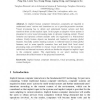Free Online Productivity Tools
i2Speak
i2Symbol
i2OCR
iTex2Img
iWeb2Print
iWeb2Shot
i2Type
iPdf2Split
iPdf2Merge
i2Bopomofo
i2Arabic
i2Style
i2Image
i2PDF
iLatex2Rtf
Sci2ools
125
click to vote
HCI
2007
2007
An Adaptive Vision System Toward Implicit Human Computer Interaction
In implicit human computer interaction, computers are required to understand users’ actions and intentions so as to provide proactive services. Visual processing has to detect and understand human actions and then transform them as the implicit input. In this paper an adaptive vision system is presented to solve visual processing tasks in dynamic meeting context. Visual modules and dynamic context analysis tasks are organized in a bidirectional scheme. Firstly human objects are detected and tracked to generate global features. Secondly current meeting scenario is inferred based on these global features, and in some specific scenarios face and hand blob level visual processing tasks are fulfilled to extract visual information for the analysis of individual and interactive events, which can further be adopted as implicit input to the computer system. The experiments in our smart meeting room demonstrate the effectiveness of the proposed framework.
HCI 2007 | Human Computer Interaction | Implicit Input | Visual Processing | Visual Processing Tasks |
Related Content
| Added | 29 Oct 2010 |
| Updated | 29 Oct 2010 |
| Type | Conference |
| Year | 2007 |
| Where | HCI |
| Authors | Peng Dai, Linmi Tao, Xiang Zhang, Ligeng Dong, Guangyou Xu |
Comments (0)

